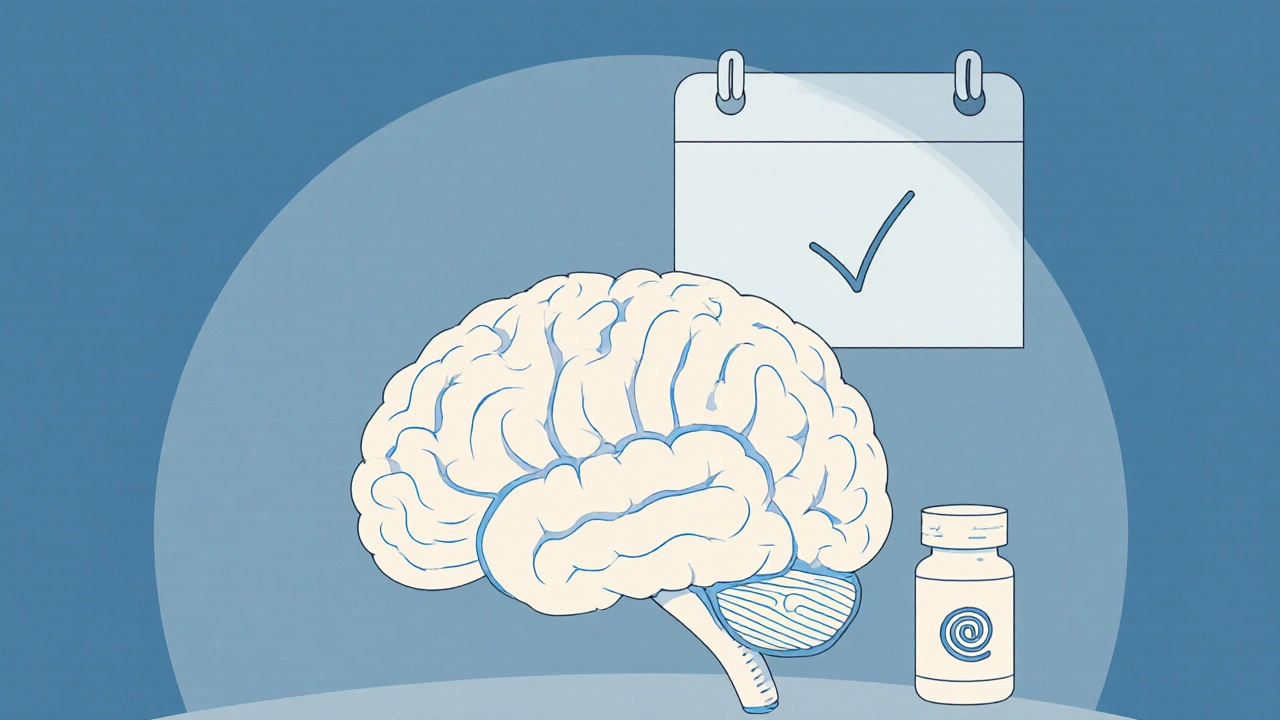
When you or a loved one is diagnosed with Alzheimer’s or another form of dementia, the first question is usually: “Which medicine actually works?” Aricept (the brand name for donepezil) often tops the list, but it’s not the only option on the market. Below we break down how Aricept stacks up against the most common alternatives, highlight key differences in how they work, and give you practical tips for deciding what’s right for your situation.
What is Aricept (Donepezil)?
Aricept (Donepezil) is a cholinesterase inhibitor approved by the FDA for treating mild to moderate Alzheimer’s disease. It works by slowing the breakdown of acetylcholine, a neurotransmitter important for memory and learning. First approved in 1996, Aricept remains one of the most prescribed dementia drugs worldwide, serving millions of patients each year.
How Do the Alternatives Work?
Other FDA‑approved dementia medicines fall into two main categories: cholinesterase inhibitors (the same class as Aricept) and NMDA‑receptor antagonists. Understanding their mechanisms helps you compare benefits and side‑effects more clearly.
- Rivastigmine is a cholinesterase inhibitor that also targets butyryl‑cholinesterase, giving it a slightly broader action on brain chemistry. \n
- Galantamine not only blocks acetylcholinesterase but also modulates nicotinic receptors, potentially boosting cognitive signaling.
- Memantine is an NMDA‑receptor antagonist. It reduces excitotoxic damage caused by excessive glutamate, a different pathway from cholinesterase inhibition.
Direct Comparison Table
| Attribute | Aricept (Donepezil) | Rivastigmine | Galantamine | Memantine |
|---|---|---|---|---|
| Drug class | Cholinesterase inhibitor | Cholinesterase inhibitor | Cholinesterase inhibitor | NMDA‑receptor antagonist |
| Typical dose | 5-10mg daily | 1.5-6mg twice daily (or patch) | 8-24mg daily | 10mg twice daily |
| Approved stage | Mild‑to‑moderate Alzheimer’s | Mild‑to‑moderate Alzheimer’s | Mild‑to‑moderate Alzheimer’s | Moderate‑to‑severe Alzheimer’s |
| Common side‑effects | Nausea, diarrhea, insomnia | Gastro‑intestinal upset, skin rash (patch) | Vomiting, dizziness, weight loss | Dizziness, headache, constipation |
| Cost (US, 2024) | ~$150/month generic | ~$180/month generic | ~$165/month generic | ~$120/month generic |
When Might Aricept Be the Better Choice?
If you’re starting therapy in the early stages of Alzheimer’s, Aricept often wins on three fronts: extensive clinical data, once‑daily dosing, and relatively moderate side‑effect profile. Large‑scale trials (e.g., the AD2000 study) showed a modest but statistically significant improvement in cognitive scores over 24 weeks compared with placebo.
Patients who value a simple pill schedule and have a history of tolerating other cholinesterase inhibitors tend to stick with Aricept because switching can complicate insurance coverage and increase out‑of‑pocket costs.
Scenarios Where an Alternative Might Shine
1. Gastro‑intestinal sensitivity: Some people experience severe nausea on donepezil. Rivastigmine’s transdermal patch bypasses the gut, reducing GI upset.
2. Advanced disease stage: Memantine is the go‑to for moderate‑to‑severe Alzheimer’s, either alone or in combination with a cholinesterase inhibitor. Studies like the MEM-MD-02 trial found that adding memantine to existing cholinesterase therapy slowed functional decline.
3. Weight loss concerns: Galantamine’s nicotinic action can help maintain appetite, making it a consideration for patients who struggle to keep weight on.
How to Choose the Right Medication
Below is a quick decision‑tree you can run through with your doctor:
- Identify disease stage (mild, moderate, severe).
- Check for any pre‑existing GI issues, skin sensitivities, or heart conditions.
- Consider dosing preferences (once daily pill vs twice daily vs patch).
- Review insurance coverage and out‑of‑pocket cost.
- Start with the recommended first‑line (often Aricept) and monitor side‑effects for 4-6 weeks.
- If intolerable, discuss switching to Rivastigmine patch or adding Memantine.
Remember, these drugs don’t cure Alzheimer’s-they aim to slow symptom progression and improve quality of life. Lifestyle factors like exercise, cognitive stimulation, and a Mediterranean‑style diet still play a crucial role.
Key Pitfalls to Avoid
- Stopping abruptly: Sudden discontinuation can lead to rapid symptom rebound. Taper under medical supervision.
- Mixing over‑the‑counter supplements without checking interactions. For example, high‑dose anticholinergic drugs (some antihistamines) can counteract cholinesterase inhibitors.
- Ignoring regular assessments: Cognitive tests every 6 months help adjust therapy before major decline.
Real‑World Experiences
Sarah, a 72‑year‑old from Auckland, began Aricept at 5mg daily after her diagnosis. Within three months she noticed “clearer thinking” during her weekly bridge games. However, she later reported troublesome insomnia. Her neurologist switched her to a lower dose of 5mg taken at bedtime, which resolved the sleep issue without losing the cognitive benefit.
Mike, 68, struggled with constant nausea on donepezil. His doctor switched him to the Rivastigmine patch, and his gastrointestinal symptoms faded, letting him stay on a cholinesterase inhibitor while his wife reported a modest slowdown in daily memory lapses.
Bottom Line Summary
Aricept remains a solid first‑line therapy for early‑stage Alzheimer’s because of its once‑daily convenience and solid evidence base. Alternatives like Rivastigmine, Galantamine, and Memantine each bring niche strengths-patch delivery, additional receptor modulation, or efficacy in later disease stages. The best choice depends on disease stage, side‑effect tolerance, dosing preferences, and cost considerations. Always involve your clinician in a personalized plan and revisit medication choices regularly.
Frequently Asked Questions
Can I take Aricept and Memantine together?
Yes. Combining a cholinesterase inhibitor (like Aricept) with an NMDA antagonist (Memantine) is a common strategy for moderate Alzheimer’s. Clinical trials show the combo can modestly improve daily function compared with either drug alone.
What should I do if I experience severe nausea on Donepezil?
Talk to your doctor right away. Options include lowering the dose, switching to a different cholinesterase inhibitor, or trying the Rivastigmine patch, which bypasses the stomach.
Is there a generic version of Aricept?
Yes. Generic donepezil became available in the US in 2010 and is widely sold in many countries, typically costing about 30‑40% less than the brand‑name product.
How long does it take to notice a benefit from Aricept?
Most patients report subtle improvements in memory and attention after 4‑6 weeks of consistent use. Full benefits may take up to 3 months, but effects plateau after that.
Are there any dietary restrictions while on Donepezil?
No strict restrictions, but taking the pill with food can lessen stomach upset. Avoid high‑dose anticholinergic supplements (like certain sleep aids) as they can counteract the drug’s action.




6 Comments
Oh great, another miracle pill that promises the world and delivers a mild stomach ache.
We stand at the crossroads of science and ideology, where choosing a drug becomes a patriotic act of defending our citizens’ cognitive future. The data on donepezil is solid, but the lazy critics love to paint it as the only hero. In reality, the alternatives each have a niche, and the market’s push for the cheapest generic is a reflection of our national values. I’ll spare you the endless minutiae, but make sure your doctor doesn’t hide the patch option behind bureaucratic red tape. The choice, ultimately, is yours-just don’t let the system dictate your brain’s fate.
When you read the endless tables of drug comparisons, you can’t help but feel like you're staring at a bureaucratic spreadsheet that somehow thinks it’s poetry. But let’s be real: the real drama unfolds in the living rooms of families fighting over a pill bottle. Imagine a grandmother clutching a blister pack of Aricept while her daughter frantically Googles side effects, and you’ll see the true tragedy. The pharmaceutical reps, armed with glossy brochures, paint each medication as a miracle, yet they conveniently omit the nightly insomnia that follows. Meanwhile, the patch of Rivastigmine sticks to the skin like a clingy ex, reminding you of every misplaced moment you’ve lost. Galantamine, with its fancy nicotinic modulation, sounds like a sci‑fi gadget, but in practice it can make you feel light‑headed at the worst possible dinner party. And then there’s Memantine, the so‑called savior for severe cases, which often feels like a lukewarm cup of tea when you’re craving coffee. Patients, doctors, insurers-all dance around the same stubborn truth: none of these drugs are silver bullets. They merely nudge the cognitive decline curve ever so slightly, like a tiny hand on a massive wheel. What many forget is that lifestyle interventions are the true heavy‑hitters, yet they rarely make the formulary. I’ve seen families spend a small fortune on brand‑name pills while neglecting exercise programs that actually spark neuroplasticity. So, when the neurologist suggests switching from Aricept to a patch, it’s not just a medical decision but a financial and emotional gamble. The cost differential, while seemingly modest, can tip the scales for seniors on fixed incomes. And the emotional toll of swapping a familiar routine for an unfamiliar one can exacerbate the very symptoms we’re trying to manage. In the end, the best choice often comes down to personal tolerance, insurance quirks, and the subtle art of listening to one’s own body. All of this, wrapped in clinical jargon, is why we need honest conversations, not just glossy charts.
Everyone loves to hail Aricept as the golden standard, yet the side‑effects tell a different story :). If you’re not careful, insomnia will turn your nights into a horror show, and nausea will ruin any appetite you have left. Remember, the patch isn’t just a gimmick; it can actually spare you the stomach turmoil. So, weigh the pros and cons before you let the pharma narrative win.
Aricept might be the default, but let’s not forget that the patch can be a game‑changer 🚀. If cost isn’t a barrier, why not give it a try? 🇺🇸
Honestly, if the insurance covers it, stick with the pill, man. No need to complicate things.